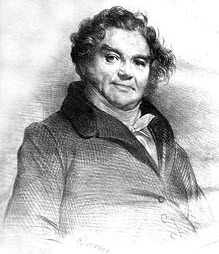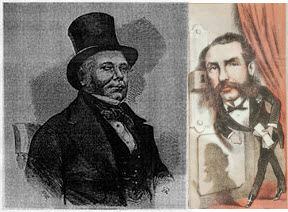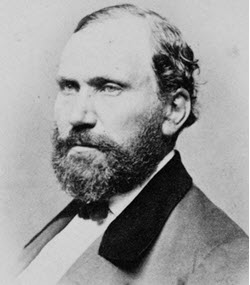Eugéne François Vidocq (France)
One early example of a private detective agency in Europe is “Le Bureau des Renseignements Universels pour le commerce et l’Industrie“, founded in France by Eugène François Vidocq in 1833. The name of the agency roughly translates into “The Office of Universal Information for Commerce and Industry”. Vidocq had past experience from being a soldier, a privateer and a criminal, and he he hired ex-convicts to work for him at the agency. Vidocq is credited with having done the first plaster casts of shoe impressions, and he also on the forefront when it came to using ballistics in investigations.
The French authorities wasn’t too happy about Vidocq’s business and tried to shut it down on multiple occasions. In 1842, just after solving an embezzlement case, Vidocq was arrested and suspected of unlawful imprisonment and of taking money on false pretences. He was initially sentenced to five years in prison and fined 3,000 francs, but the Court of Appeals released him. According to Vidocq, the embezzlement case had probably been a part of a set up to get him convicted.
In addition to his detective agency, Vidocq ran a printing company, created his own indelible ink and invented a tamper-resistant bond paper.
 Charles Frederick Field & Ignatius Paul Pollaky (UK)
Charles Frederick Field & Ignatius Paul Pollaky (UK)
When Charles Frederick Field retired from the Metropolitan Police in London in 1852 he set up an “enquiry office”. His business was successful, and he also befriended the celebrated author Charles Dickens who wrote articles about his work.
In 1862, one of Field’s employees – Ignatius Paul Pollaky from Hungary – left Field to set up a rival business. Pollaky became famous in his own right and mentioned in several books published in the 1870s. He was also the model for the character Paddington in the 1881 comic opera Patience.
Allan Pinkerton (USA)
 In 1850, Allan Pinkerton established a private detective agency and named it the Pinkerton National Detective Agency. Together with his agents, Pinkerton carried out undercover investigations and crime detection, and also provided private security solutions for businesses.
In 1850, Allan Pinkerton established a private detective agency and named it the Pinkerton National Detective Agency. Together with his agents, Pinkerton carried out undercover investigations and crime detection, and also provided private security solutions for businesses.
The earliest known female private detective in the USA was Kate Warne, hired by Allan Pinkerton in 1856.
The Pinkerton National Detective Agency became a household name in 1861 when Pinkerton managed to unveil a plot to assassinate then President-elect Abraham Lincoln. The agency was also connected to the tracking of infamous western outlaws, including Jesse James, Butch Cassidy, Sundance Kid, and The Reno Gang.
During the late 1800s, several notable U.S. companies payed Pinkerton’s agency to manage potentially violent labour force conflicts, since Pinkerton was now providing not just investigators but armed guards as well. In the aftermath of the Homestead Riot of 1892, several state passed laws restricting the use of private security guards during union strikes. These laws were commonly known as “anti-Pinkerton laws” since Pinkerton was such a dominating force in the field.
The Anti-Pinkerton Act of 1893 is still in force in the United States, limiting the federal government’s ability to hire private investigators or mercenaries.